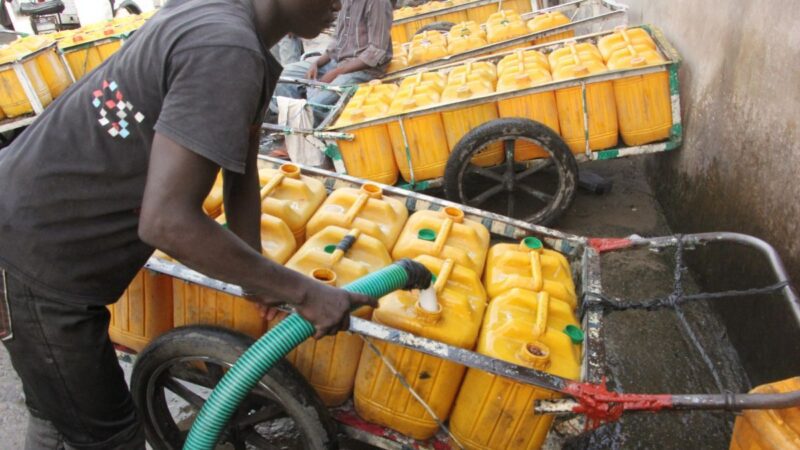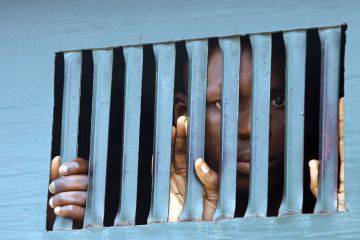National Issues
The Water Woes in Njimtilo Community, Maiduguri: A Cry for Help -By Mustapha Abdullahi
Inadequate water supply hampers economic growth within the community. Agriculture, a primary source of livelihood, suffers greatly due to insufficient irrigation facilities. This impacts crop yield and prevents farmers from engaging in year-round farming activities. Additionally, lack of water affects small-scale businesses, local industries, and curtails job opportunities.

The scarcity of water is a global crisis that affects millions of people worldwide. While developed countries struggle to optimize water usage, certain communities in developing nations, such as Njimtilo in Maiduguri, Nigeria, face severe water scarcity, leading to dire consequences for the inhabitants.
Located in the northeastern region of Nigeria, Maiduguri is the capital city of Borno State, an area severely impacted by insurgency and conflict. The Njimtilo community, situated on the outskirts of Maiduguri, has been grappling with water scarcity for years. The challenges they face are exacerbated by factors such as population growth, limited infrastructure, and environmental factors.
Njimtilo is located in a semi-arid region, experiencing dry and hot weather conditions for the majority of the year. This makes it prone to water scarcity, as natural water sources, such as rivers and lakes, become unreliable during periods of minimal rainfall. Moreover, climate change-induced weather patterns have further altered the region’s water availability.
Lack of sufficient investment in water infrastructure compounds the challenges faced by the Njimtilo community. Pipelines, boreholes, and water treatment plants are either non-existent or poorly maintained. This leads to leakages, contamination, and a lack of access to clean, potable water sources.
Over recent years, Njimtilo has witnessed an influx of people escaping the violence in areas surrounding Maiduguri. This massive population growth has strained the existing water resources, causing a surge in demand without appropriate infrastructure to cater to it.
Without clean and accessible water, the Njimtilo community faces various health risks. Contaminated water sources promote the spread of waterborne diseases such as cholera, typhoid fever, and dysentery. Lack of sanitation and hygiene facilities further exacerbate the health crisis.
Inadequate water supply hampers economic growth within the community. Agriculture, a primary source of livelihood, suffers greatly due to insufficient irrigation facilities. This impacts crop yield and prevents farmers from engaging in year-round farming activities. Additionally, lack of water affects small-scale businesses, local industries, and curtails job opportunities.
The lack of water directly impacts educational institutions in Njimtilo. Students, mostly children, spend a significant amount of time collecting water instead of attending school. Their educational prospects are compromised, perpetuating a cycle of poverty and hindering the community’s overall development.
The Nigerian government, aware of the water scarcity issue, has initiated several projects aimed at addressing the problem. These efforts include building boreholes, water treatment plants, and improving water storage capacity. However, the implementation of such projects has been inconsistent and sometimes poorly monitored, resulting in inefficiencies and limited impact.
Aid organizations, both local and international, have intervened in Njimtilo to provide short-term relief by drilling boreholes and distributing water. While commendable, this has created dependence on external assistance rather than fostering sustainable solutions that empower the community to manage their water resources effectively.
The ongoing insurgency in the region has impeded the government’s efforts to tackle the water scarcity issue effectively. Security concerns restrict access to some areas, hindering the completion of infrastructure projects and impeding the provision of vital services.
Engaging the community in decision-making processes, raising awareness, and promoting ownership over water resources can empower Njimtilo’s inhabitants to take responsibility for their own water needs. This could involve establishing community-based water management committees and involving local experts in planning and implementation.
Embracing rainwater harvesting techniques, such as building reservoirs or using rooftop rainwater collection systems, can provide a cost-effective solution to mitigate the water shortage during the wet season. This also allows for the recharge of groundwater resources and reduces the dependence on unreliable surface water sources.
Providing education and raising awareness about safe water practices, sanitation, and hygiene are essential in curbing waterborne diseases. It is crucial to educate the community about the importance of proper water storage, treatment, and personal hygiene practices to ensure sustainable water usage and prevent contamination.
The lack of water in Njimtilo community, Maiduguri, is a significant challenge that calls for immediate attention from local authorities, government agencies, and international organizations. Sustainable solutions that prioritize community involvement, infrastructure development, and behavioral change are essential to address this crisis effectively. Providing the Njimtilo community with access to clean and sufficient water not only improves their quality of life but also fosters economic growth and sets the foundation for a better future. It is high time that concerted efforts are undertaken to uplift this community by resolving its water scarcity woes.
Mustapha Abdullahi 300 level Student Mass Communication department Borno State University, Maiduguri.
09048790079,09084112201



















